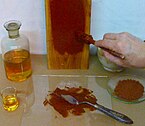| Plant oils |
|---|
 |
| Types |
| Uses |
| Components |
A drying oil is an oil that hardens to a tough, solid film after a period of exposure to air, at room temperature. The oil hardens through a chemical reaction in which the components crosslink (and hence, polymerize) by the action of oxygen (not through the evaporation of water or other solvents). Drying oils are a key component of oil paint and some varnishes. Some commonly used drying oils include linseed oil, tung oil, poppy seed oil, perilla oil, castor oil and walnut oil. The use of natural drying oils has declined over the past several decades, as they have been replaced by alkyd resins and other binders.
Since oxidation is the key to curing in these oils, those that are susceptible to chemical drying are often unsuitable for cooking, and are also highly susceptible to becoming rancid through autoxidation, the process by which fatty foods develop off-flavors.[1] Rags, cloth, and paper saturated with drying oils may spontaneously combust (ignite) after a few hours as heat is released during the oxidation process.
- ^ Ulrich Poth (2002). "Drying Oils and Related Products". Ullmann's Encyclopedia of Industrial Chemistry. Weinheim: Wiley-VCH. doi:10.1002/14356007.a09_055. ISBN 978-3527306732.